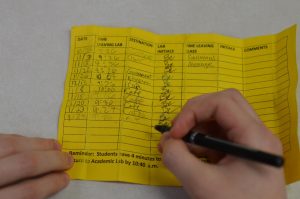The Fourth Block of Freedom
Academic Lab’s successes, failures, and potential fixes
Journalism teacher Christine Stricker writing an Ac Lab pass for a student. A common criticism of Ac Lab is the pass system. Some teachers and students believe that the pass system is overly complicated and hinders students’ ability to get help. Photo by Trey Williams.
February 13, 2020
Academic lab is universally loved by students. It’s the only period of the day where all students are given almost complete freedom with their time. People can study, meet with teachers, or go to the Colt Cafe and take time to relax.
Despite love from students, not everybody in the building appreciates how students and teachers use the time. Many teachers believe that the period is not used to its full potential.
“I don’t like that for so many kids it’s not used wisely,” said math teacher Nathan Wilson.
Even though Wilson’s sentiment was echoed by every teacher I interviewed, there is still great respect for Ac Lab as a concept. Even math teacher Kurt Lehmann, the most critical teacher of the current system I interviewed, called Ac Lab necessary.
“If you’re going to do a type of block scheduling, there needs to be time for extra support built in,” Lehmann said. “Ac Lab allows us to meet support for 70 or more percent of our students if used”.
There are multiple issues students and teachers have with the way Ac Lab works. What are these issues with Ac Lab? What should be done about these issues? How are teachers adapting to these issues? Through my conversations with students and teachers, here is what I learned.
Lehmann’s Proposal
What’s wrong with the current system? Many teachers believe that Ac Lab’s lack of structure inevitably leads to wasted time.
“I think it’s human nature that if you’re given unstructured time to do unstructured things, you’re not necessarily going to use it productively,” English teacher Libby Reed said. “But some kids really need that time to be monitored specifically to get work done.”
Lehmann believes that the current system could be changed for the better.
“One of the things that two of the Parkway schools do is they eliminate some of the travel time,” said Lehmann. “Part of our issue is that we have students, especially younger students, who just walk and walk and walk and walk.”
The system Lehmann is referring to takes place in Parkway North and Parkway South. Instead of being able to travel to whatever classroom a student needs to go to whenever they want, students are limited to traveling to just two classrooms. This means that if a student goes to a classroom at the beginning of lab, they have to stay there until the first half of the period is over. After that, they can go to the next class for the second half of the lab.
Lehmann suggested that this system could be put in place for freshmen, and freedom could be given back as the students age and stabilize their grades.
“For our freshmen I don’t understand why we don’t do something like that,” said Lehmann.
Reed experienced South’s system, called the Mod system, firsthand as a teacher.
“The Mod system worked pretty well, particularly for kids who needed to be in two places and needed someone to externally manage their time,” said Reed. “I think what that did do for kids who really needed help was it kept wandering down to a minimum.”
Despite certain benefits, the Mod system created an entirely new set of problems, according to Reed.
“There were downsides to it, like when there were kids who just needed to go check in with multiple teachers and then wanted to come back to Ac Lab,” said Reed. “There was no real time for them to do that.”
Not surprisingly, the restriction of freedom caused mixed feelings from the students.
“Kids who felt like they were on top of things and didn’t need that kind of monitoring kind of resented the system,” said Reed.
However, Lehmann’s proposed system would not experience this to the same degree due to the restriction being grade based.
Lehmann’s change might soon be a reality for the math wing. Due to mounting frustration of loitering in the halls, lack of productivity, and the general chaos of the period, the math department is considering bringing the Lehmann proposal, or the Mod system, to all the classrooms in the math-wing.

Passes: Are They Necessary?
Wasted time in Ac Lab is not the only aspect of the period teachers are frustrated with. Another controversy surrounds the pass system.
Theoretically, the way Ac Lab is supposed to work starts with a student getting a pass from the teacher they want to go to before Ac Lab starts. Then, the student needs to bring the pass to Ac Lab, show it to their teacher, and have their lab teacher sign a different pass. Then, the student must go to class, do their work, then get signed out on that same pass by the teacher of the class they go to. Then, if they want to go to the class again next lab, the whole thing needs to be done all over again.
That’s a lot of passes. Some teachers have expressed concern that this system just gets in the way of learning.
“I think it hurts students who want to go somewhere and can’t, ‘cause they didn’t plan ahead or weren’t able to get a pass. I also think some students take advantage and say, ‘I can’t travel, I don’t have any blue passes,’” said Lehmann. “I think the pass system does not need to be done anymore for any reason.”
Once again, Lehmann is not alone on this issue.
“I think the additional blue pass is a barrier to helping students learn,” said AP Government teacher Skylar Kim. “I struggle with the idea that a student that needs help can’t go because of a formality.”
Wilson described another scenario where the passes have weaknesses.
“What I don’t like about the pass system is when a student comes up to me [and says] ‘Hey can I go see my English teacher?’ and I’m like, ‘No, you don’t have a pass’, and the next kid comes up and says ‘Can I go to the Colt Cafe?’, and I say ‘Sure!’” said Wilson. “I almost feel like I should just let kids travel because I don’t want to punish the kid who wants to go see a teacher and reward a kid who doesn’t.”
Still, all these teachers acknowledge that the pass system allows teachers to know who they have coming for Ac Lab. Without a system like this pass system in place, there is a fear that students will go places they aren’t supposed to go and teachers won’t know what to expect during that time. Removing the pass system would be removing some of the only structure left.
Another controversial pass issue has to do with directed travel, where students lose the freedom to choose which class they want to go to. When a student gets put on directed travel, instead of receiving their normal blue or green tracking pass, tracking where they have gone for Ac Lab, the students on directed travel get a bright pink pass.
“I really dislike the colored passes for direct travel,” Kim said. “I think it’s a form of shaming and I would really prefer that it be the same color.”
Some teachers were more against the differently colored passes than others. The counter-argument to keeping all pass colors the same is that it allows teachers to know what students they need to send to their mandatory classes.
“It does call them out, and it’s nobody else’s business if they’re on directed travel or not,” said Reed. “But I understand, from an administrative and organizational point of view, why it’s a different color, because it makes it easier for us to differentiate.”
Still, the current system makes at least some students uncomfortable.
“I agree with Mrs. Kim about the pass colors,” said junior Maya Glutzman. “Everybody looks at you, like, ‘you have a pink pass.’”
Everybody agrees that the pass system in place is not ideal. From the plethora of passes prerequisite for proper passage, to bright pink passes that let every student know who is and isn’t on directed travel, something students and teachers both agree on is that everybody would prefer to give the current system a pass.
What do we do?
Ac Lab is a surprisingly complicated issue. There are so many different needs from so many different people that need to be balanced. Any one system is going to help someone but hurt somebody else.
The way Ac Lab is structured right now puts emphasis on freedom for the students. Students can make decisions for themselves about how to spend their time without much trouble from teachers or administration, which makes many students look forward to their fourth block.
On the flip side, the current system is not the most efficient or effective for education. While opportunity for mistakes is important for growth, it is incredibly easy to take advantage of such freedom.
What if a change to the system saved someone from failing a class? What if the lack of structure for Ac Lab is partially to blame for students not graduating on time? What if a minor change to the system could help boost the grades of every wandering freshman in the building? Until change is made, nobody will know.

